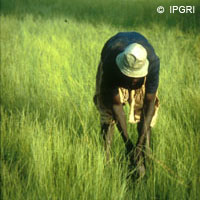EU bringing ancient crop into 21st century
A new project funded under the EU's Sixth Framework Programme (FP6) is examining how to boost the production of one of the planet's oldest and most nutritious grains, fonio. Farmers in West Africa have grown fonio for around 5,000 years to make the staple food Djouka, but production of the crop has always been difficult because the fonio seeds are extremely small - slightly larger than a grain of sand. This makes the husking of the precious seeds particularly labour intensive and tiresome. Now, the FONIO project, with €900,000 support under FP6's international scientific cooperation (INCO) umbrella, aims to find ways to maximise the use of this ancient crop. Managed by the French Agricultural Research Centre for International Development (CIRAD), the project includes researchers from Belgium, Burkina Faso, France, Guinea, Mali, the Netherlands and Senegal. The project began on 1 January 2006. Nutritionally, fonio has some similarities to white rice, but with significantly more trace elements such as magnesium, zinc and manganese, and proteins, making the crop very important in areas where other protein sources such as meat are limited. CIRAD had previously helped to develop a specially adapted hulling machine for fonio, the 'GMBF fonio huller' with expertise from Guinea, Mali and Burkina Faso. This machine significantly reduced the time needed to process Fonio, and the grain's popularity has increased as a result. Now that the processing has been simplified, the FONIO project aims to look at all stages of the crop's production and infrastructure. Researchers will first try to plug the knowledge gaps in the scientific and technical records for Fonio. Next, they will tackle commercialisation of the crop and ways to add value by increasing the quality or finding alternative uses, such as export, which could in turn improve the local market for the crop. Project coordinator, CIRAD's Jean-Francois Cruz, believes there is a European market for this earliest of crops. 'The first step is to define quality criteria for precooked fonio, and determine consumer demand in Africa and Europe. As regards quality, sand (used for processing) in whitened (processed) fonio is one of the main problems still to be solved in order to produce quality fonio for sale in supermarkets and on the export market,' he says.
Countries
Belgium, Burkina Faso, France, Guinea, Mali, Netherlands, Senegal



